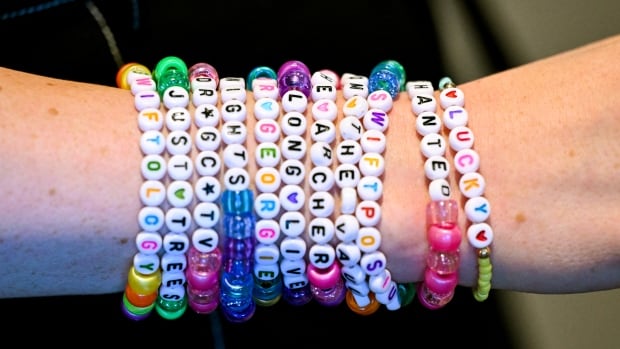Friendship bracelets made out of colourful plastic beads aren’t anything new, but thanks to Taylor Swift’s Eras Tour, they’ve seen a massive rise in popularity.
Some claim the lyric “So make the friendship bracelets, take the moment and taste it,” from her 2022 Midnights album, was the catalyst for this trend. But fans have been trading bracelets at her shows since Swift’s debut Fearless Tour in 2009-10.
Swift has 281 million followers on Instagram alone — and in cities where her tour stops, North American arts and crafts store Michaels has seen a 300 per cent sales boost in its beads and jewelry categories in the days leading up to her concerts, John Gehre, who oversees merchandising at the chain, told USA Today.
Adding to the phenomenon, the hospital where Swift was born gave out homemade bracelets to babies born on Dec. 13 last year, the pop star’s birthday.
Despite their name, friendship bracelets aren’t exactly eco-friendly. Here’s an in-depth look at the steps these bracelets go through — from production to concerts to landfills.
Taylor Swift’s concerts have posted significant boosts to the economies of every city where she’s performed this tour. In Toronto, hosting six Taylor Swift concerts in a row will be like hosting six Super Bowls in a row, one expert says.
Mining and drilling for raw materials
“A lot of times there’s a focus on plastic pollution, but there hasn’t been as much a focus on the upstream impact,” Shannon Smith, executive director of FracTracker Alliance, a non-profit organization based in Pennsylvania, said, referring to what goes into the making of a product — including extraction of natural resources, manufacturing and transportation.
Ninety-nine per cent of all new plastic, including the beads used in friendship bracelets, are made from fossil fuels, mainly oil and methane. The raw materials are extracted from the ground through mining or fracking.
When it comes to fracking, “each step of the way, there is some kind of environmental or health impacts,” Smith said. Mining also has an impact on the environment, leading to water contamination, deforestation, soil erosion and air pollution.
After extraction, the raw materials are refined and cracked — which breaks them down into smaller molecules, ethylene or propylene — and then formed into plastic pellets called nurdles. These plastic pellets are less than five millimetres in diameter, qualifying them as microplastics.
Nurdles “are often transported over huge distances by ship,” said Erica Cirino, communications manager at Plastic Pollution Coalition and author of Thicker Than Water: The Quest for Solutions to the Plastic Crisis. “A lot of these container ships spill [their contents], and so the nurdles escape very easily into the ocean.”
About 200 kilotonnes of nurdles leak into the ocean each year, according to a 2020 report from the Pew Charitable Trusts and SYSTEMIQ, adding to ocean pollution and harming marine life. “Virtually every creature in the ocean has consumed plastic at some point or another in their lives, if not every day,” Cirino said.
Moulding the plastic
Most plastic beads are made with a manufacturing process called injection moulding, which allows companies to mass produce plastic items quickly and accurately, but it also consumes a lot of energy.
The process starts by heating and melting the nurdles. The molten plastic is poured into steel moulds and cooled with water to solidify the plastic. The used water often contains microplastics and chemicals that can contaminate water supplies if not properly treated.
“There are more than 16,000 different possible chemicals in any given piece of plastic,” Cirino said, adding that the treatment process doesn’t capture all of it.
At this point, the beads are ready to be packaged and shipped to stores.
The aftermath
To an untrained eye, some friendship bracelets might look like a mishmash of letters, but they represent favourite lyrics and memes. Swift fans trade bracelets before, during and after her shows. Some even continue to trade bracelets online and ship them around the world.
“Some of those plastic beads are going to be around potentially for decades upon decades,” said Susanne Brander, associate professor in the fisheries, wildlife and conservation sciences department at Oregon State University. “We think that every piece of plastic that has ever been manufactured is still out there in some form.”
Environment Minister Steven Guilbeault says Canadians are worried about plastic pollution.
Globally, only nine per cent of plastic waste is recycled, according to a 2022 report on plastic pollution by the Organization for Economic Co-operation and Development. The report also said that 50 per cent of plastic waste ends up in landfills and 19 per cent gets incinerated, which releases chemicals into the air.
Brander urges people who make and trade friendship bracelets to take a step back and think about sustainability and consumerism. Fans could make one or two bracelets instead of filling their entire arm, she said.
There are other types of beads that aren’t as harmful to the environment, such as those made of wood or glass. Plant-based beads are also starting to be manufactured due to concerns surrounding Mardi Gras celebrations, where necklaces of plastic beads are tossed from parade floats to spectators on the street. Some companies, such as U.K.-based Brothers Make, even produce beads out of plastic waste.
Taylor Swift “has a movement, and because of that, she might have an opportunity to educate,” Brander said, adding that it would be nice if the pop star encouraged her fans to make more sustainable bracelets.
These Windsor Swifties came together at a local library to make friendship bracelets and listen to their favourite songs by the pop singer.




